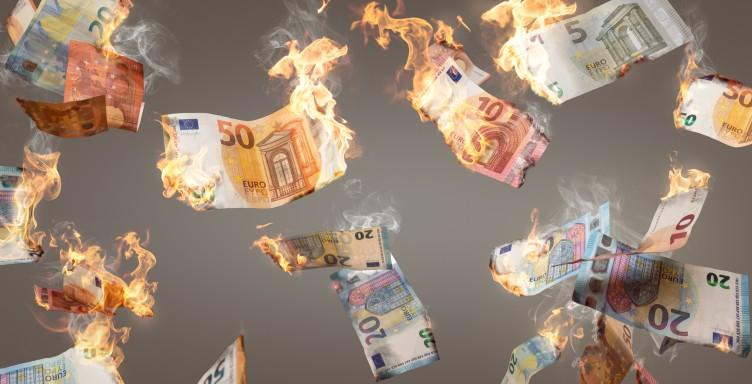For those who dodged the news on Friday, Coinbase acquired our digital asset subsidiary, One River Digital Asset Management. It’s an outstanding outcome and an incredible opportunity for us all, following a wild two-year ride on a journey that has only just begun. For my summary of how and why it all happened [click here]. Now back to work…
Overall: “That is money that cannot be spent elsewhere,” said German finance minister Christian Linder. You see, annual interest on Germany’s government debt has risen 10x in the past two years, from 4bln to 40bln euros. That’s not a particularly big number, roughly 1% of GDP. But that’s not the only consequence of recent rate rises. In the race to exit Europe’s negative interest rate oxymoron, a multitude of changes are taking place. Central bank balance sheets, bloated by a decade of monetary manipulation, now yield less than overnight interest rates. That gap is producing staggering losses for the very same central bankers responsible for creating it. The German Bundesbank is thus expected to generate a 193bln euro loss over the coming decade. That’s a big number for the delicate German psyche. It’s the kind of number that will require a government bailout – indirectly with the passage of time and inflation. And if we’ve learned one thing from our long litany of financial crises, it’s that institutions requiring government assistance lose their independence, if not explicitly, then implicitly. It’s not that central banks have ever been truly independent; they haven’t. It’s that the illusion of their independence from the politicians to whom they are accountable has ebbed and flowed over the decades. Before this cycle is over, central banks across the developed world will turn to their politicians to beg for bailout forgiveness, even as they raise interest rates, which in turn lift interest payments that these same politicians must pay on government debts. Any illusion of independence will fade. Calls for wholesale change will naturally come from the fringe, as it is the establishment that led us here. “Inflation and the future depreciation losses that will arise from the ECB’s monetary policy – adopted in violation of its mandate – will be the nail in the coffin of Europe’s prosperity and the end of the euro,” declared Alice Weidel, co-leader of Germany’s rightwing AfD party. “And no one will be able to say they weren’t warned.”
Week-in-Review: Mon: US pending home sales upside surprise Jan. m/m 8.1% (1.0% e), Dallas Fed manuf -13.5 (-9.3e), US Durable Goods orders -4.5% (-4.0%e), Fed’s Jefferson rejects arguments for raising 2% inflation target, S&P +0.3%; Tue: Upside in EU inflation France CPI 6.2% (6.1%e), Spain 6.1% (5.8%e), US Consumer Conf. 102.9 (108.5e), White House announces $39B for chip-makers, S&P -0.3%; Wed: Japan capital spending 7.7% (7.1%e), UK House Px -1.1% (-0.9%e), UK mortgage approvals 39.6k (38.5ke), UK manuf. PMI 49.3 (49.2e), German CPI 8.7% (8.5%e), Germany unemp change +2k (-10ke), Eurozone Manuf. PMI 48.5 (48.5e), Bundesbank warns about losses on bond purchases, US Manuf. PMI 47.3 (47.8e), ISM Manuf 47.7 (48.0e), ISM Prices Paid 51.3 (46.5e), Fed’s Bostic says rates need to go to 5%-5.25% and stay there well into 2024, Fed’s Kashkari open minded on size of March hike, S&P -0.5%; Thu: More EU inflation surprises Italian CPI 9.9% (9.5%e), Italian unemp 7.9% (7.8%e), EU unemp 6.7% (6.6%e), US initial jobless claims 190k (195ke), continuing claims 1655k (1669k e), US Unit Labor Costs 3.2% (1.6%e), S&P +0.8% Fri: UK PMI 53.1 (53.0e) UK Services PMI 53.5 (53.3e), EU PMI 52.0 (52.3e), EU Services PMI 52.7 (53.0e), US Services PMI 50.6 (50.5e), US ISM Services 55.1 (54.5e), Fed releases monetary policy report affirming their strong commitment to 2% inflation and further rate hikes, S&P +1.6%.
Manufacturing PMI (high-to-low): Hungary 56.5 (previous month 55), India 55.3 (previous 55.4), Hong Kong 53.9 (previous 51.2), Russia 53.6/52.6, Canada 52.4/51, Italy 52/50.4, Greece 51.7/49.2, China 51.6/49.2, Indonesia 51.2/51.3, Vietnam 51.2/47.4, Mexico 51/48.9, Spain 50.7/48.4, South Africa 50.5/48.7, Turkey 50.1/50.1, Singapore 50/49.8, UK 49.3/47, Brazil 49.2/47.5, Taiwan 49/44.3, Switzerland 48.9/49.3, Netherlands 48.7/49.6, Poland 48.5/47.5, South Korea 48.5/48.5, United States 47.7/47.4, Japan 47.7/48.9, Norway 47.5/49.6, France 47.4/50.5, Austria 47.1/48.4, Sweden 47/47, Germany 46.3/47.3, Czech Republic 44.3/44.6. Services PMI: India 59.4/57.2, Ireland 58.2/54.1, Spain 56.7/52.7, China 55/52.9, Japan 54/52.3, UK 53.5/48.7, Russia 53.1/48.7, France 53.1/49.4, Italy 51.6/51.2, Germany 50.9/50.7, US 50.6/46.8, Brazil 49.8/50.7, Sweden 45.7/50.8.
Weekly Close: S&P 500 +1.9% and VIX -3.18 at +18.49. Nikkei +1.7%, Shanghai +1.9%, Euro Stoxx +1.4%, Bovespa -1.8%, MSCI World +1.9%, and MSCI Emerging +1.7%. USD rose +5.5% vs Bitcoin, +3.1% vs Ethereum, and +0.5% vs Indonesia. USD fell -2.7% vs Chile, -2.5% vs Mexico, -1.5% vs South Africa, -0.9% vs India, -0.8% vs Euro, -0.8% vs China, -0.8% vs Sterling, -0.6% vs Australia, -0.5% vs Sweden, -0.4% vs Yen, -0.4% vs Turkey, -0.3% vs Russia, -0.1% vs Canada, and flat vs Brazil. Gold +2.1%, Silver +1.4%, Oil +4.4%, Copper +2.9%, Iron Ore +2.4%, Corn -1.5%. 10yr Inflation Breakevens (EU +22bps at 2.67%, US +14bps at 2.52%, JP +3bps at 0.72%, and UK +20bps at 3.72%). 2yr Notes +4bps at 4.86% and 10yr Notes +1bps at 3.96%.
Feb Mthly Close: S&P 500 -2.6% and VIX +1.30 at +20.70. Nikkei +0.4%, Shanghai +0.7%, Euro Stoxx +1.7%, Bovespa -7.5%, MSCI World -2.5%, and MSCI Emerging -6.5%. USD rose +5.9% vs Russia, +5.5% vs South Africa, +4.8% vs Australia, +4.7% vs Yen, +3.7% vs Chile, +3.2% vs Brazil, +2.7% vs Euro, +2.7% vs China, +2.6% vs Canada, +2.5% vs Sterling, +1.7% vs Indonesia, +0.9% vs India, +0.4% vs Turkey, and flat vs Sweden. USD fell -3.1% vs Ethereum, -2.8% vs Mexico, and -1.5% vs Bitcoin. Gold -5.6%, Silver -12.4%, Oil -2.7%, Copper -3.4%, Iron Ore +1.8%, Corn -7.0%. 10yr Inflation Breakevens (EU +37bps at 2.51%, US +13bps at 2.38%, JP -5bps at 0.70%, and UK +20bps at 3.61%). 2yr Notes +62bps at 4.82% and 10yr Notes +41bps at 3.92%.
Year-to-Date Equities (high to low): Mexico +21.1% priced in US dollars (+11.8% priced in pesos), Czech Republic +20.5% priced in dollars (+18.2% in koruna), Greece +18.9% in dollars (+19.9% in euros), Ireland +17.9% (+18.8%), Italy +16.4% (+17.4%), Spain +14.1% (+15%), France +12.6% (+13.5%), Austria +12.3% (+13.2%), Euro Stoxx 50 +12.3% (+13.2%), NASDAQ +11.7%, Germany +11% (+11.9%), Taiwan +10.8% (+10.4%), Sweden +9.6% (+10.2%), Netherlands +9.5% (+10.4%), Russell +9.5%, Chile +9% (+3.4%), Argentina +8.7% (+21.7%), China +7.6% (+7.7%), MSCI World +6% priced in dollars, UK +5.9% (+6.6%), Hungary +5.7% (+1.5%), Korea +5.7% (+8.7%), Canada +5.6% (+6.2%), Denmark +5.5% (+6.4%), S&P 500 +5.4%, Finland +4.7% (+5.6%), Belgium +4.1% (+5%), HK +3.3% (+4%), Poland +3.2% (+4.8%), Japan +3% (+7%), Philippines +2.9% (+1.4%), Australia +2.6% (+3.5%), Switzerland +2.5% (+4.3%), Russia +2.3% (+5.5%), Portugal +1.5% (+2.3%), South Africa +1.3% (+8%), New Zealand +1.2% (+3.4%), Indonesia +0.9% (-0.5%), Norway -1% (+5%), Singapore -1.1% (-0.6%), India -1.6% (-2.8%), Saudi Arabia -1.7% (-1.9%), UAE -3% (-3%), Thailand -3.4% (-3.7%), Venezuela -3.8% (+38.6%), Brazil -3.8% (-5.3%), Malaysia -4.1% (-2.8%), Colombia -4.3% (-5.6%), Turkey -6.3% (-5.4%), Israel -8.4%
Glowing: “Last week US inflation surprised higher, and this week it’s Europe’s turn,” said Lindsay Politi, our inflation PM, the two of us on the trading floor early, Bloomberg’s glowing. “Eurozone HCPI is 8.5% and policy rates are 3%. If this data was presented without context, one would expect real rates this low with inflation so high was the product of a condemned emerging market whose central bank had lost all independence,” said Lindsay. “But negative real rates and high inflation are a feature across our most esteemed central banks.”
Glowing II: “To be fair, the market isn’t worried that -5.5% real policy rates are too low,” continued Lindsay, inferring from the inverted German yield curve. If anything, the market seems worried they’re too high. “The market could be right, but I see too much focus on the nominal rate tightening.” Using the Fed’s Core PCE for inflation, real US rates are still negative. “Despite all the aggressive tightening and expectations that inflation will moderate on its own to deliver positive real rates, positive real policy rates remain elusive.”
Glowing III: “Through the years of over $30trln in central bank bond buying, we were assured fighting inflation wouldn’t be a problem because we had already learned what to do,” said Lindsay. But like many things in life, knowing what to do and doing it isn’t easy. “Inflation and deflation are both poorly understood. The data isn’t great and there’s tendency to extrapolate from 1970s or Japan’s deflation. Both of which are data sets of one, with unique features. We need to be open minded about where inflation could be in a year or two.”
Glowing IV: “One thing we may be getting wrong is demographics,” said Lindsay. “We assume, because of Japan, that older populations are inherently deflationary.” In the 1970s, when populations were young and debt levels were low, higher rates seemed to curb inflation. Higher rates make it more expensive to borrow but also increase income on bond portfolios. “It’s not clear that rate hikes work as well today as in the past. Income on older people’s investment portfolios has been increasing, and there are more of those than in the 1970s.”
Glowing V: “We take comfort that we won’t have a 1970s style wage spiral because labor unions don’t have the same power today,” she said. “But we ignore social security benefits,” that increased 8.7% this January. “There are 66mm Americans receiving social security. That’s the same number of people that work in manufacturing, retail, health care, and leisure combined.” If wages for all those industries increased by 8.7% at the start of the year we’d be very concerned about inflation. “This is trying to apply 1970s style thinking to a very modern inflation problem.”
Glowing VI: “And today, there so many different financial assets locked away from the effects of central bank policies,” said Lindsay. Many homeowners will hold their 30yr mortgages to term. Pensions and insurance companies will keep bonds they bought at 0%, 1%, and 2% yields until they mature. “I see inverted yield curves and wonder if they’re really saying what we think they’re saying. Are markets really expecting deep recession, buying bonds at low yields, or are they just too locked in from years of QE to be able to sell?”
Anecdote: “When I’ve studied historical inflations they’re almost always caused by a combination of complacency and a focus on the nominal at the expense of real,” said Lindsay Politi, the two of us on the trading floor, our early morning chat. “After a long period of stability, inflation starts to surprise on the upside.” Initially there’s disbelief. Policy makers assume it’s temporary, wait for more data. But while nominal policy rates remain unchanged, higher inflation means real policy rates are falling.” Although it looks like central banks are standing still, they’re unwittingly easing. “When it’s decided inflation is a problem, usually real rates have already fallen meaningfully.” The initial tightening is simply undoing the easing that happened during their delay. “And while they are trying to catch up, the declines in real yields while they were waiting have fueled a second inflationary wave.” Now they’re swimming against an increasingly ferocious current. “The further they fall behind the bigger the problem. It becomes so entrenched that it’s almost impossible to undo.” Any hesitation to act simply increases the nominal interest rate required to fight inflation. And there are rate levels that become hard for central banks to reach. “Over the last few decades there’s been a whack-a-mole debt problem.” In the 1990s a corporate debt problem developed, monetary policy shifted it onto household balance sheets in the 2000s, and monetary policy shifted it onto official balance sheets in the 2010s. “Although we may not see the breakages on the balance sheets that we in the financial markets are accustomed to reviewing, they’re happening.” This week the Bundesbank warned about central bank balance sheets losses. In the fight over the US debt ceiling, many are still looking at 2022 data, not noticing how dramatically interest payments have already increased as a portion of federal payments. “There is a segment of the economy that may not be able to tolerate higher nominal interest rates, and it’s the part of the economy that sets nominal interest rates.”
Good luck out there,
Eric Peters
Chief Investment Officer
One River Asset Management
Disclaimer: All characters and events contained herein are entirely fictional. Even those things that appear based on real people and actual events are products of the author’s imagination. Any similarity is merely coincidental. The numbers are unreliable. The statistics too. Consequently, this message does not contain any investment recommendation, advice, or solicitation of any sort for any product, fund or service. The views expressed are strictly those of the author, even if often times they are not actually views held by the author, or directly contradict those views genuinely held by the author. And the views may certainly differ from those of any firm or person that the author may advise, converse with, or otherwise be associated with. Lastly, any inappropriate language, innuendo or dark humor contained herein is not specifically intended to offend the reader. And besides, nothing could possibly be more offensive than the real-life actions of the inept policy makers, corrupt elected leaders and short, paranoid dictators who infest our little planet. Yet we suffer their indignities every day. Oh yeah, past performance is not indicative of future returns.





